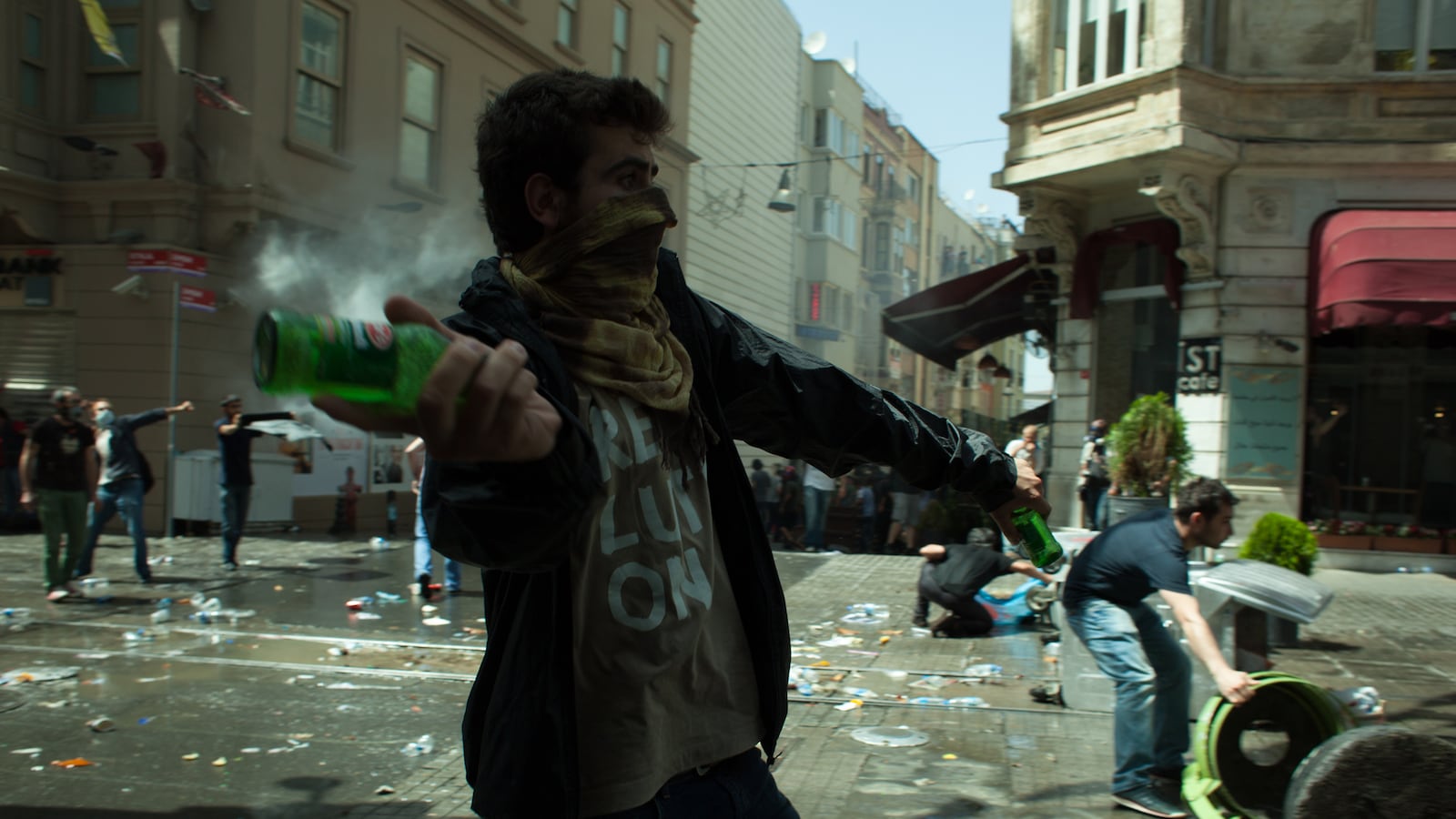In central Istanbul’s Taksim Square, clashes between police and protesters are commonplace. Activists from myriad political groups regularly flood the city’s main square to make their stand. The agitators are usually met by Turkey’s feared riot police, who disperse them with tear gas, water cannons and batons. Police chase demonstrators down nearby Istiklal Street, Istanbul’s famous and bustling pedestrian thoroughfare, past cafés and brand-name shops as storekeepers close their windows to keep out the tear gas.

But the demonstrations gripping the Taksim area this week have had the feel of something new. What started as a small sit-in to save a beloved local park has seen thousands of people take the streets in a broader protest against Prime Minister Recep Tayyip Erdogan. Central Istanbul is now a jarring scene of mayhem, with ambulance sirens blaring and protesters battling the cops. By Friday evening, activists had swarmed Istiklal Street, erecting barriers by overturning potted trees, as police fired their water cannons and volley after volley of tear gas. Dozens of people were reportedly injured and detained. “I don’t think this will stop,” said Ilker Ortac, a 40-year-old writer, standing amid a surging crowd with a surgeon’s mask hanging off of his face.
Solidarity protests also erupted in other Turkish cities on Friday, including Ankara, the capital, and Izmir, Turkey’s third-largest city.
This picture of mayhem—with the central Istanbul suddenly taking on the air of Cairo’s Tahrir Square as tourists and shoppers ran for cover—was exactly the opposite of what the Turkish government had in mind when it began the urban redevelopment project that initiated the conflict.
The government is in the midst of a massive renovation effort around Taksim Square, designed to make the city ever more modern as it goes down to the wire on its bid to host the 2020 Olympic Games. Commenced late last year, the project—which aims to remake the area, currently a hub for traffic and gridlock, into a pedestrian zone—was already controversial, threatening to upend entire neighborhoods. But the most contentious aspect had always been the plan’s central component—razing tiny Gezi Park, one of central Istanbul’s last remaining green spaces, and replacing it with a shopping mall modeled after an old military barracks.
With the park’s demolition set to begin on Tuesday, a small group of activists staged a sit-in to save it. After police beat them back and bulldozers began uprooting trees, the sit-in became a large-scale occupation of the park, with people of all stripes joining the effort and #OccupyGezi trending on Twitter. And since police violently dispersed these protesters at dawn on Friday, Taksim and Istiklal have been roiled by growing unrest.
The movement to save the park, meanwhile, has also become a push against Erdogan and his Islamic-leaning Justice & Development Party—and the heavy-handed governing style that demonstrators say is epitomized by the controversy in Taksim. “The government has managed to turn a simple, modest, peaceful protest into a massive opposition against itself,” says Ceren Kenar, a Turkish journalist and columnist. “This is more than a protest against urban planning in Istanbul.”
Earlier this week, Erdogan declared that the government’s park plans would proceed despite the public outcry, stirring the anger of residents who say that citizens are allowed little input in the redevelopment plans that are overtaking the city. Grievances against Erdogan range from the city’s constant construction to new restrictions like a curb on alcohol sales and Erdogan’s maneuvering to shift the country’s center of power to the presidency in advance of a likely campaign for the office after he reaches his term limit as party leader next year. Erdogan also faces growing opposition to his policy of supporting Syria’s rebels and refugees, on top of longstanding criticism for issues such as the government’s persecution of journalists. Suddenly, the popular prime minister is looking unusually beleaguered.
On Friday, an Istanbul court ordered a suspension of the park project pending a legal petition from activists. But protesters on Istiklal Street said the issue had become more than that. “I see a lot of demonstrations here,” said a woman who works as a teacher at a school nearby. “They’re never enough to make an impact. They’re always too small. But this one is about everybody.”






